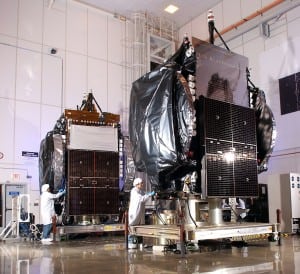North America News
ViaSat Wins $3.24 M Contract with US Department of Energy for Cybersecurity Infrastructure
The U.S. Department of Energy (DOE) has granted 11awards totaling approximately $30 million for the development of new tools and technologies to strengthen protection of the nation’s electric grid and oil and gas infrastructure from cyberattacks. Among the contracts is an award of $3.25 million to ViaSat Inc.
The company will work closely with Southern California Edison and a large utility headquartered in the South to investigate, develop, and deploy an enhancement to ViaSat’s critical infrastructure protection system that incorporates policy-based automated responses to cyber events, increasing the resiliency of transmission and distribution networks.
ViaSat’s cybersecurity system focuses on securing utilities’ operational grids. The system implements an authenticated and encrypted “security fabric” that protects machine-to-machine communications between devices, and provides grid operators with the ability to visualize the security state of the system. Sensors continually update the information in real time, creating a hierarchical view that operators can use to identify issues, then drill down to individual nodes to contain or fix problems as they arise.
“Our approach is to use our government information assurance expertise to develop systems that can help keep the nation’s energy flowing,” said Jerry Goodwin, VP and general manager of secure network systems at ViaSat.
- US DoD Selects Iridium for Gateway Support and Maintenance
The Defense Information Systems Agency (DISA) has awarded a contract to Iridium Communications to support the U.S. Department of Defense (DoD) Enhanced Mobile Satellite Service (EMSS) Gateway in Hawaii. The Gateway Maintenance and Support Service (GMSS) contract value for the initial year is $7.2 million with four additional one-year options available for a potential total value of $38 million.
The DoD’s Iridium EMSS gateway serves as a dedicated portal for the uplink and downlink of mission-critical voice and data traffic through Iridium’s satellite network for DoD users and their federal partners. Upgrades and maintenance performed on the gateway will support the renewed, five-year EMSS contract Iridium was awarded by DISA this month and will ensure it operates effectively to handle the network’s current capabilities as well as the enhanced services that will become available with Iridium NEXT – the company’s next generation satellite constellation scheduled for first launch in early 2015.
“The DoD’s dedicated gateway allows for direct connectivity into their Defense Switch Network (DSN) providing a critical level of operational security for their users. Our gateway work will include upgrades and maintenance supporting the DoD’s use of the Iridium network, particularly as we anticipate demand increasing to service their global voice, low and high-speed data, paging and Distributed Tactical Communication Services (DTCS) needs,” said Scott Scheimreif, executive vice president of government programs for Iridium.
L-3 GCS Receives Military Band Type Approval for GX Terminals from Inmarsat
L-3 Global Communications Solutions (L-3 GCS), a specialist in the supply of deployable satellite communications solutions and turnkey systems, has received type approval from Inmarsat for its range of military Ka-band terminals, authorizing their use over the Global Xpress (GX) network.
This marks an important milestone in the development of GX, a global high-speed broadband network, which is on schedule to achieve full global coverage by the end of 2014. L-3 GCS’ type approval covers its family of terminals, which are used extensively by military and other government customers in the United States and across the world. The specific devices covered by the Ka-band Inmarsat type approval are the Panther .6m, Hawkeye III Lite 1.2m, and Hawkeye III 1.6m, 2.0m and 2.4m terminals.
“Military customers in the United States and other countries have shown interest in the capabilities of GX and so we are delighted that the first of many GX-capable military grade terminals are now type approved. This will now allow those government users to augment their use of WGS and other national systems with our GX high capacity beams and the exact same SATCOM terminal,” said Peter Hadinger, president of Inmarsat’s U.S. Government Business Unit.
US Air Force Extends SES’ Hosted Payload Contract
[Via Satellite 10-18-13] The U.S. Air Force Space and Missile Systems Center has awarded a two-year contract extension to SES Government Solutions (SES-GS). The contract allows the Air Force to continue its research and development mission through the use of the Commercially Hosted Infrared Payload (CHIRP) aboard the SES 2 satellite.
This extension will allow the Air Force to explore additional operational scenarios and understand the mission utility of different approaches to operating the wide-field-of-view infrared sensor payload. The original five-year term contract was signed in July of 2008 with the U.S. Air Force Space and Missile Systems Center.
The primary purpose of the CHIRP experiment was to test a new type of infrared sensor from geosynchronous altitude. After successful integration of the CHIRP payload onto the SES 2 commercial spacecraft, the satellite was launched on Sep. 21, 2011 from Kourou, French Guiana. Since the launch, the sensor’s performance has met many milestones and exceeded estimated life expectancy on orbit.
“CHIRP truly illustrates how a hosted payload aboard a commercial satellite can go above and beyond in providing the U.S. Government with reliable and affordable access to space,” said SES-GS President and CEO, Tip Osterthaler.


